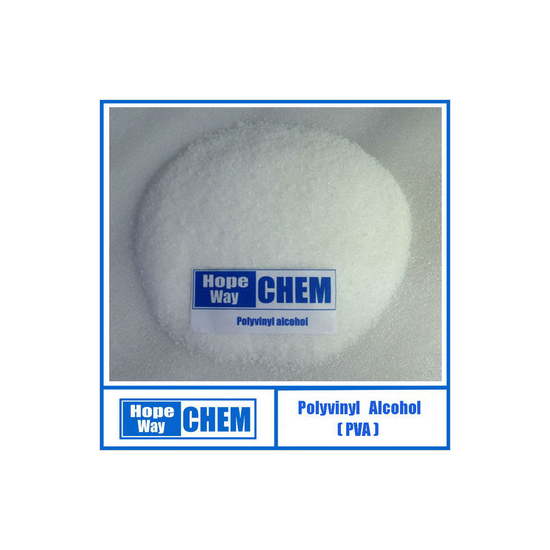Introduction
Polyvinyl Alcohol (PVA) is a water soluble and biodegradable synthetic polymer. It is a dry solid, and is available
in granule and powdered forms. Grades include both fully hydrolyzed and partially hydrolyzed. PVA is an excellent
adhesive with superior bonding strength, film forming and emulsifying properties. The film of PVA exhibits outstanding
resistance to oil, grease and solvents. In addition to its film forming property, it has excellent adhesion to both hydrophilic
and hydrophobic materials. PVA has been extensively used in textile industry for warp sizing and resin finishing;
in paper industry for surface sizing and pigment coating; in the production of PVAc emulsion as protective colloid;
in the suspension polymerization of PVC as a dispersion agent; as binder for ceramics, magnet, foundry cores and pigments.
PVA is manufactured by polymerization of vinyl acetate monomer, by hydrolysis of the polyvinyl acetate.
HOPE WAY PVA is produced in a wide range of hydrolysis and polymerization. In the partially hydrolyzed grade,
86-89 mole% of acetate group is replaced by alcohol group. Likewise, in the fully hydrolyzed grade, 98.5~99.2
mole % of acetate group is replaced by alcohol group.
Individual PVA grade varies in molecular weight (degree of polymerization) and degree of hydrolysis. In order to
help our valued PVA users to choose the most appropriate grade, HW has defined HW PVA grade as following:
HWF-17: Fully hydrolyzed PVA with degree of polymerization about 1700.
HWP-20: Partially hydrolyzed PVA with degree of polymerization about 2000.
The two-digit number indicates the degree of polymerization by one-hundredth; the higher the number, the
higher degree of polymerization, so is the viscosity.
The most important properties which the majority of applications depend are degree of polymerization and
degree of hydrolysis. The degree of polymerization is an expression of the size of polymer. The higher the
degree of polymerization of polymer is, the bigger the size and the longer the length of polymer is. Similarly, the
degree of hydrolysis is an expression of the ratio of hydrophilic alcohol group and hydrophobic acetate group.
The properties of PVA are summarized as follows.
1 Based on degree of polymerization
The higher degree of polymerization of polymer is, the higher viscosity of solution and adhesion strength of film are.
The higher degree of polymerization of polymer is, the less water solubility and the higher solvent resistance are.
The higher the degree of polymerization of polymer is, the higher tensile strength of PVA film is.
The higher the degree of polymerization of polymer is, the less penetration and softness of film is.
The higher the degree of polymerization of polymer is, the better protective ability is.
2 Based on degree of hydrolysis- Dissolving properties
Fully hydrolyzed grade PVA (HWF type) can be easily dissolved in over 90°C water, but it only swells in room temperature water.
Partially hydrolyzed grade PVA (HWP type) can be slowly dissolved in room temperature water.
But in normal uses, raising temperature to 90°C is necessary for saving dissolving time.
Super low hydrolyzed grade PVA (HWC type) can be dissolved in 25°C to 50°C water, according to their grades.
3 Characteristic of HWF type PVA
Good affinity to hydrophilic fiber such as cotton, rayon and paper.
Better water resistance film property than HWP type PVA film.
Viscosity is less stable in the condition of low temperature and high concentration than HWP type PVA.
Dissolving rate is slower than HWP type PVA
4 Characteristic of HWP type PVA
Good affinity and cohesion power to hydrophobic fiber such as polyester, nylon, polyester /cotton blended and polyester/ rayon blended fiber.
Good compatibility with oiling agent.
Good solution viscosity stability.
Better protective colloid property than HWF type PVA.
Dissolving rate is slower than HWP type PVA




